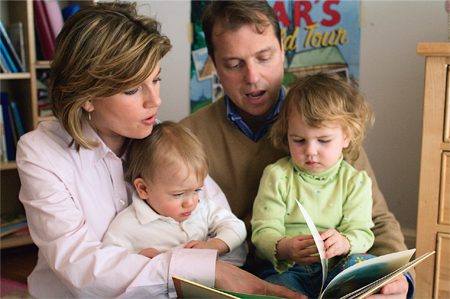Network news she fell into. Motherhood she chose.
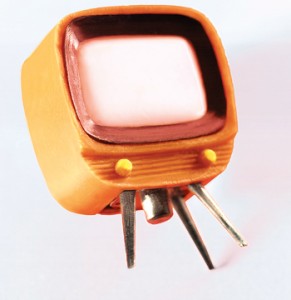 It’s been a big day for Ella. Today it was Ella’s turn to bring treats—blueberries and soy milk—to preschool. When her mom picked her up from school at noon, they rushed to the next stops: visiting teaching. Mom had both toddlers in tow, 2-and-a-half-year-old Ella and 15-month-old William. The loaded minivan arrived at the first stop, and Ella played happily during the visit.
It’s been a big day for Ella. Today it was Ella’s turn to bring treats—blueberries and soy milk—to preschool. When her mom picked her up from school at noon, they rushed to the next stops: visiting teaching. Mom had both toddlers in tow, 2-and-a-half-year-old Ella and 15-month-old William. The loaded minivan arrived at the first stop, and Ella played happily during the visit.
At the second appointment, Ella was beginning to get restless. It was after 2 p.m. and she was ready for her nap. Midway through the appointment, Ella made it clear she was ready to go home.
Mom has done her best to balance it all—preschool, church responsibilities, two toddlers. But she decides it’s time to cut this lesson short and get these kids home. When they arrive, she feeds Ella a quick snack and puts her down for a nap. Ella is asleep before her head hits the pillow.
Through it all, Ella’s mom remains undaunted. After all, it’s the life Jane Clayson Johnson (BA ’90) always imagined for herself.
But life doesn’t always happen exactly the way we imagine it. When Jane Clayson entered BYU in 1985 on a violin scholarship, she arrived with a tidy plan for herself: graduation would be in April, the wedding in August; the colors would be teal and peach; the dress would be McCall’s pattern number 7847.
The April graduation happened in 1990. But there she was, driving to a celebratory dinner with her mom, dad, and sister—but no fiancé.
“What am I going to do now?” she distinctly remembers thinking.
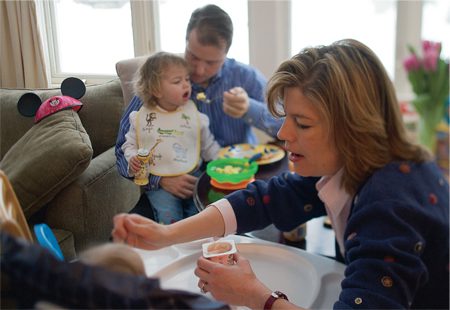
Jane and Mark Johnson team up for mealtime. Feeding, nurturing and referee ring Ella and William is a full-time job for Jane, sometimes more so than the one she left behind.
Looking back, Johnson can see that her plan had derailed long before commencement. In fact, she can pinpoint specific moments during school and beyond in which her path took turns that she would come to acknowledge as miraculous. Unexpected professional opportunities led to a career of finding and telling compelling stories, and today Johnson is telling her own.
Jane Clayson, a junior at BYU, was leaving the Harold B. Lee Library when she ran into a graduate student who worked at KBYU. “You should come down and see what we do,” he encouraged her. “Why not?” she thought.
The exchange led to a student job at KBYU-FM. It turned out she loved it, and more important, she was good at it. Who knew writing news updates and weather reports would be so interesting and rewarding?
Her job at KBYU led to a part-time reporter position her senior year with KSL Television in Salt Lake City. She was surprised how much she liked this job, too, and had no idea how unusual it was to land this spot as a student.
“It was just for fun. I was thinking, ‘Until my real life kicks in, I’ll do this,’” she says. Clayson had changed her major to broadcast journalism, but it was just a degree—something to check off her list. She still had time to meet Mr. Right.
Driving to her graduation dinner, however, Clayson realized her “real life” wasn’t beginning and her “fun life” was unintentionally extending. She had already been offered a full-time reporting position with KSL, still oblivious to how big a deal this was for a fresh-out-of-college reporter.
But she learned quickly. It was a rough start, she admits, noting that she was a rookie in a newsroom full of experienced journalists. Clayson soon found a mentor on staff and flourished for the next six years at KSL. It was there she won her first major awards: an Emmy for her story on Charlie—a Park City boy who traveled to California to die—and an Edward R. Murrow Award for her coverage of children in China who benefited from philanthropic Utah doctors. She had clearly earned her place.
The man on the other end of the phone thought so too. A talent agent based in New York City, he had seen Clayson’s work on someone else’s audition tape. ABC News was starting a cable news channel based in Los Angeles and was looking for anchors.
Within a few weeks Clayson left KSL and headed to L.A. At this same time, Clayson had gotten married. Her husband worked in Los Angeles, and though it was now six years after her college graduation dinner, she saw the L.A. job as a blessing and a sign that real life was finally beginning.
But, again, things didn’t go as planned. When she arrived in L.A., she found out—through a headline in the Los Angeles Times—that ABC had cancelled its plans for cable news. But the network honored Clayson’s contract and kept her on as a correspondent in their Los Angeles bureau, reporting for Good Morning America and World News Tonight with Peter Jennings. Her first big assignment was the O. J. Simpson trial. Her determined coverage put Clayson on a long path of big assignments that took her from Jakarta to Kosovo.
In her personal life, Clayson faced difficult challenges as her marriage crumbled. “It was a hard time” is all she will say.
As her marriage ended, Clayson realized that real life had already begun. She was a successful network correspondent, and she had been given professional opportunities that had helped her establish a remarkable career.
“By the time I got to ABC in Los Angeles, I had this career, which I had never planned on and, frankly, didn’t always want,” she says. “It was a very pivotal moment for me. As soon as I put everything I had—my fears, my anxiety, my hopes, my dreams—all on the altar and gave it all to God, things changed.”
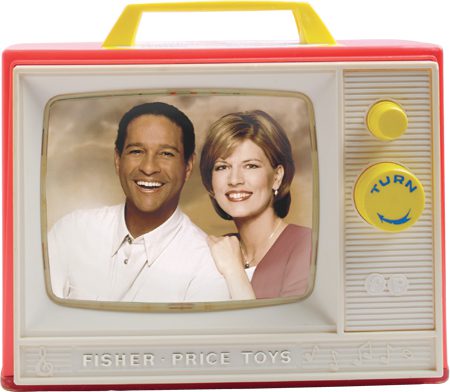
Cohosting the Early Show with Bryant Gumbel meant 3:45 a.m. mornings for Jane Clayson. her job as a mother didn’t get any easier.
The phone rang again. This time the voice was familiar. It belonged to the man who had been Clayson’s agent since she took the job with ABC three years earlier. He said he had an opportunity she’d be thrilled about: CBS was retooling its morning show. They had already signed on Bryant Gumbel, and they wanted to talk to her about cohosting.
In 1999 Clayson got the spot and began the hardest job of her life. Her daily schedule started at 3:45 a.m. “Act natural, be friendly, and look great at 7 o’clock in the morning,” she quips. The two-hour show had her bouncing from hard-hitting interviews with secretaries of state to conversations with Hollywood celebrities. Her afternoons and evenings were filled with research, interviews, appearances, and more research. She typically dropped in bed by 10 p.m.
Her memories include the distinct sound of chopping—hard, deliberate chopping—coming from Martha Stewart as Clayson stood next to her in the studio’s cooking area and read the intro to their interview. Stewart, a regular contributor to the Early Show, had become embroiled in the ImClone insider-trading scandal, and the tension was clearly high on the set that day.
“I was taken aback by this 12-inch chef’s knife she had in her right hand,” Clayson recalls. “She spent the entire interview aggressively chopping cabbage.” Knife or no knife, as a journalist Clayson knew she had to ask real questions about the real situation—the federal investigation, not the cabbage. As the segment progressed, Stewart famously declared: “I just want to focus on my salad.”
It was one of many unforgettable experiences during Clayson’s three years with the Early Show. When the network retooled again in 2002, Clayson left the program but stayed with CBS as a correspondent and fill-in anchor for Dan Rather on the Evening News.
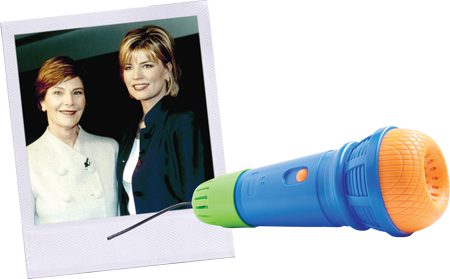
Snapshots like this one, posing with First Lady Laura Bush, line Jane Johnson’s stairwell. Unforgettable as such moments may have been, Johnson has traded them for moments she finds even more fulfilling – watching her children grow.
Today her stairwell is lined with photos that give a brief history of her eventful time at CBS—George W. Bush giving her a hardy handshake; Laura Bush wrapping an arm around her; Barbara Walters leaning in with a comment; George Clooney sitting in the cockpit of an airplane; David Letterman welcoming her on his show.
Reaching the pinnacle of a high-profile career, Clayson was becoming as much a news maker as she was a news gatherer.
“I want to set you up with a guy in Boston.” It was the sort of call she got often, actually. As a beautiful, successful, single Latter-day Saint, Clayson was the Steve Young of women. Who wouldn’t want to meet her? She entertained this call—it was from her sister, after all—and she agreed to meet Mark Johnson, a former Navy officer, a Harvard Business School graduate, and a recent convert to The Church of Jesus Christ of Latter-day Saints.
They don’t call it love at first sight, but they were quite taken with each other. When their busy schedules allowed them to finally date, they didn’t waste time. It was a short courtship, and, on the grounds of the Salt Lake Temple in the summer of 2003, Mark asked Jane to marry him.
The very next morning—just 12 hours later—another call came from Clayson’s agent. He had a deal for her at another network. It was an extremely attractive four-year contract. Another amazing opportunity.
But first things first—she had just become engaged. The wedding was set for September, and her current contract with CBS wouldn’t expire until January. She was in no rush to decide her next career step. She was taking a much bigger step first.
After they were married, Jane and Mark spent three months commuting between Manhattan and Boston as she fulfilled her responsibilities with CBS and they considered the decisions yet to be made. “I didn’t have a preset notion that upon marriage she would never work again or that she wouldn’t work more than 20 hours a week. There were no restrictions,” Mark recalls. “I could sit and observe her working that through in her mind and through her prayers and through her own seeking and pleading and wrestling.”
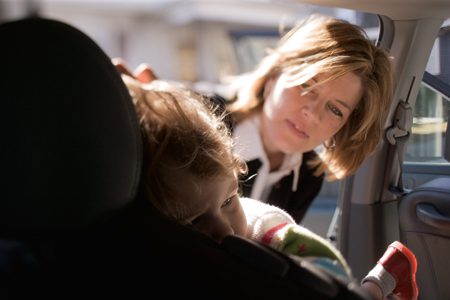
After a long morning, it’s nap time, and exhaustion sets in as Ella collapses into her car seat. Jane now chauffeurs two little ones, a stretch from the days when she was escorted to the biggest breaking news.
Johnson hadn’t forgotten Plan A—graduate, get married, have kids. But the path she ended up on had been exceptionally rewarding. She loved to travel, meet interesting people, find the true story, get politicians to say something that wasn’t on their script. It became somewhat of an inner struggle. If she left her successful career to be a wife and mother at home, would she lose part of herself?
Johnson likes to talk about life happening in seasons. After much “working it through,” she knew which season this was for her. “I felt like I had had this particularly long season in news, and I wanted to embrace another season of life in its entirety, completely,” Johnson says.
So she turned down the offer, let her contract expire at CBS, and moved permanently to Boston. The day after she arrived—the very first day she woke up without a job to go to—she learned she was pregnant.
Now, three years later, Johnson is up early again most mornings. Today is Friday, and toddler music class starts at 9 a.m. There are Cheerios and Cheez-Its on the family-room carpet, but the toys are tucked in a corner, and that’s a small victory for Johnson, the mother of two children and the stepmother of three.
While Ella and William eat their breakfast, Johnson cleans up dishes from last night’s dinner, set aside so she could take care of the bedtime routine—baths, books, songs, and kisses goodnight.
This morning Johnson has managed a shower and a dab of makeup—two things she doesn’t always fit in before the day gets away from her. She hasn’t, however, managed breakfast for herself. It’s time to go, and breakfast will have to wait.
At music class they sing about animals, then they practice soft and loud. They dance to an East Indian tune, and they sing about putting the instruments away. William spends the hour on his mother’s lap, while Ella bounces from activity to activity.
“She is independent,” Johnson says with a smile. Later in the backyard, the strong-minded girl wants to swing, but she wants her own swing, not the double swing she can share with William. Johnson allows her daughter to choose while deftly channeling the strong will toward the double swing. Johnson says she wouldn’t trade Ella’s independence for the world.
William is soft and cuddly and curious. Inside the house he finds a ball and rolls it under the bookcase—and calls his mom to retrieve it. William climbs in her lap and gives her a hug. After a snuggle, he’s back to the ball, then to the Jack-in-the-Box, then on to the blocks. “He has a very sweet disposition,” Johnson says.
The story could end on that note: Johnson living life as a mother and wife and homemaker—the “real life” she had always planned on. But ever the journalist, Johnson has found a new story she feels compelled to tell.
This story was first envisioned after hearing her colleagues’ responses when she announced her decision to leave network news. Many were supportive, but many were not. “When I left my career, people told me I was nuts. They told me I was out of my mind,” Johnson says. Someone flippantly said she should just get a nanny. Another warned her she would regret this decision for the rest of her life.
Disappointing as those comments were, Johnson found even more haunting what happened at a gathering of prominent Latter-day Saints in Washington, D.C. “The men in the room confidently and appropriately stated their professional achievements, which were impressive,” Johnson recalls. “Then their wives stood up, and this is how many of the women described themselves: ‘Oh, I’m just a mom.’ ‘I don’t have any credentials, I’m just raising our six kids.’ ‘I’m just a stay-at-home mom.’”
“Do they know something I don’t?” Johnson asked herself. She had given birth to Ella only three months earlier. She had left her career to be a mother, and now she wondered how any woman could feel her job as a mother needed a qualifier like just. “Is it a matter of time,” she questioned, “before I figure it out—that motherhood is somehow unimportant or a second-rate occupation?”
When her son, William, was born, she received a powerful answer to the questions that had been troubling her. Born three months prematurely—and weighing just 2.5 pounds at his tiniest—William was in the hospital for 11 weeks. Johnson was there every day, though there were days William was so sick that Johnson wasn’t allowed even to touch him. He rarely responded to her as his little body struggled to live outside the womb.
“One afternoon, a very perceptive neonatologist came over to our little corner of the unit, put her arms around me, and with such kindness said, ‘William can’t express it right now, but on his behalf, let me say thank you for being here. These babies know their mothers. And even though it doesn’t feel as though you’re making a difference… you are,’” Johnson remembers. “That night, after my husband had given William a beautiful priesthood blessing, I remember standing with both arms through the portals of his incubator. The feeling came over me so strongly that, the Lord needed me, as a mother, and that I needed Him, as my Savior, to make this baby whole. In that moment, in a very tangible way, I realized that mothers matter.”
Mothers matter. It was the answer she’d been looking for and the message Johnson has taken up as her cause. She proclaims it as often as she has the chance, whether through public speaking or private conversations or, most recently, in her book, I Am a Mother.
“I want every woman to feel in her soul that among the many important things that women do, mothering is the most important thing, whether a woman biologically bears a child or not,” she says. Building on her own experience, Johnson asserts that motherhood comes at different times and in different ways to different women. But whether a woman is mothering her own children, a niece or nephew, or a neighbor down the street, whether she is a working mother or a single mother, society needs to place more value on the work of mothers—nurturing, teaching, caring for, and connecting with children.
“My path is not your path,” she says, “and your path is unique to you. Your path is not your sister’s or your neighbor’s path, but regardless of how or when a woman journeys to—and through—motherhood, we’ve got to help each other and support each other.”
Now that her own path has led her from chasing down the biggest news stories of the day to chasing after two of the busiest of toddlers, Jane Clayson Johnson reflects on what she’s learned from that path. “I wouldn’t be honest if I didn’t say there are times when it’s hard. There are definitely moments when I am down on my hands and knees mopping up yet another mess, when I look up at the TV to see an old friend interviewing someone really interesting or globe-trotting on a big story and I think, ‘What have I done?!’ But as I look into the faces of my children, I would not trade this season of mothering . . . not for anything.”
Johnson believes much of our culture is built upon measuring success with instant rewards and immediate gratification. “In the world, if you can’t measure it, we don’t value it,” she says. “But so much of mothering is intangible, and you often don’t see the results of your work for years.”
Her path has also provided helpful perspective. “It’s given me the power of contrast to say I know what it’s like to have the things that the world values. I know what it’s like to live what many people would call a glamorous, interesting, intellectually stimulating life, and I can say with the full conviction of my heart—with full power in my soul—that nothing is more important than the work I’m doing within the four walls of my own home, with my children. Nothing. No interview, no award, no network TV program—nothing.”
In the end, she says, most people won’t remember Jane Clayson the news anchor or network correspondent, but Mark and her children will be changed forever because of Jane the wife and mother. “There will always be another job. There will always be another high-profile assignment. But that is all fleeting,” Johnson says. “It’s not to say that I’m not appreciative of the many extraordinary experiences I have had. But at the end of the day, the most important thing is this: it is my family, it is my children, and it is what I teach them.”
Lisa Ann Thomson is a freelance writer and editor in Salt Lake City.







